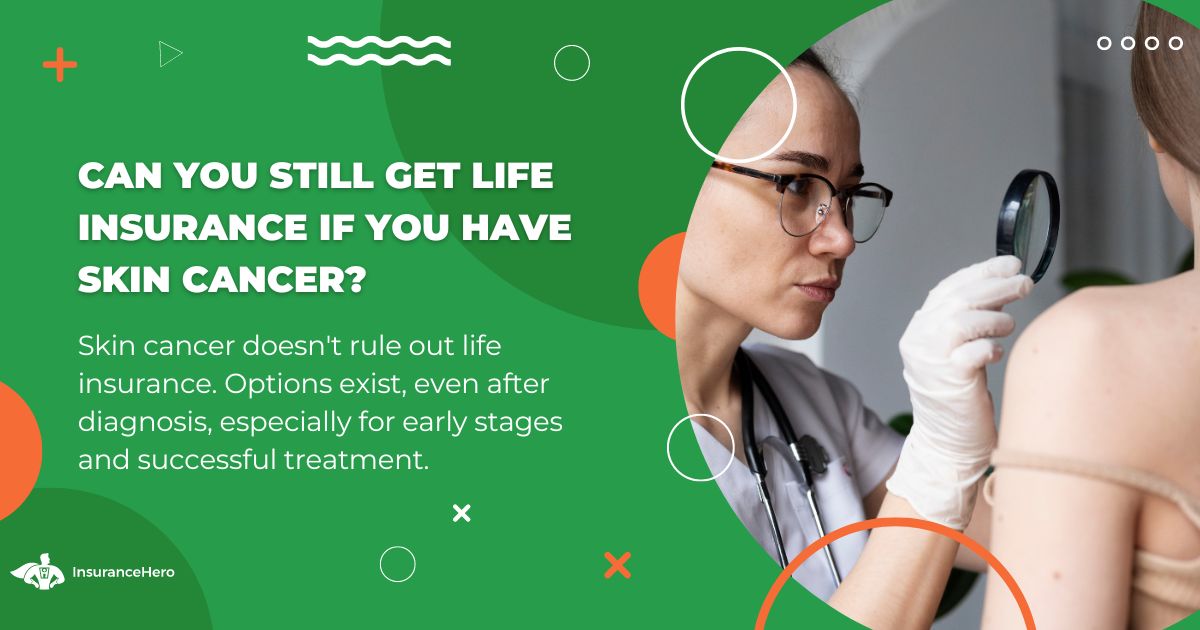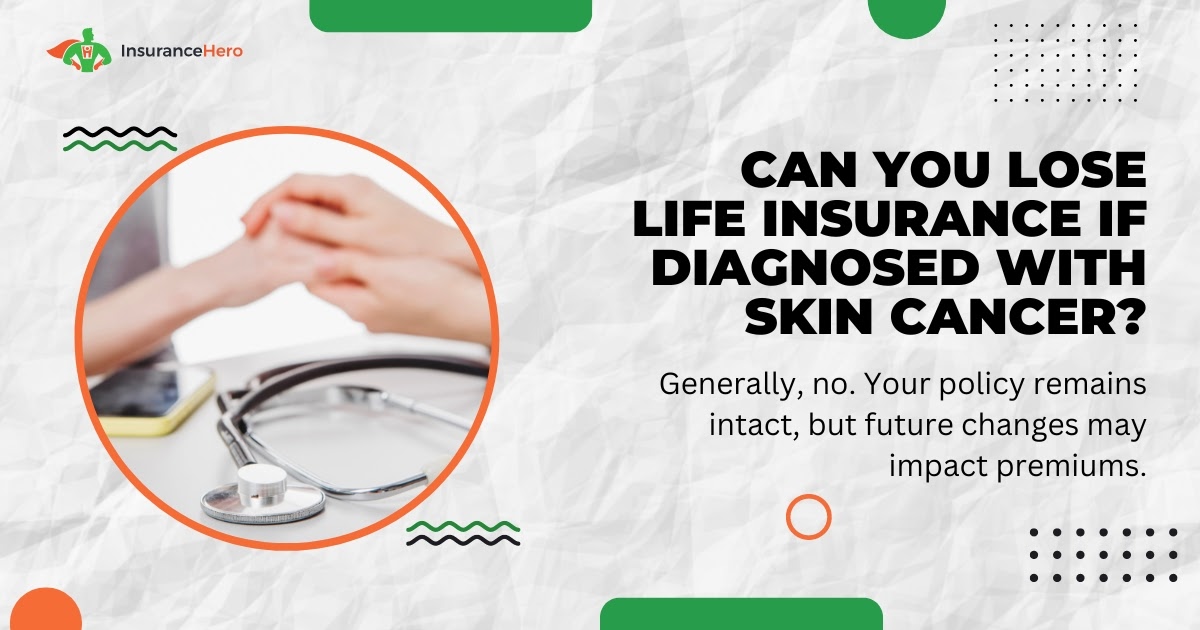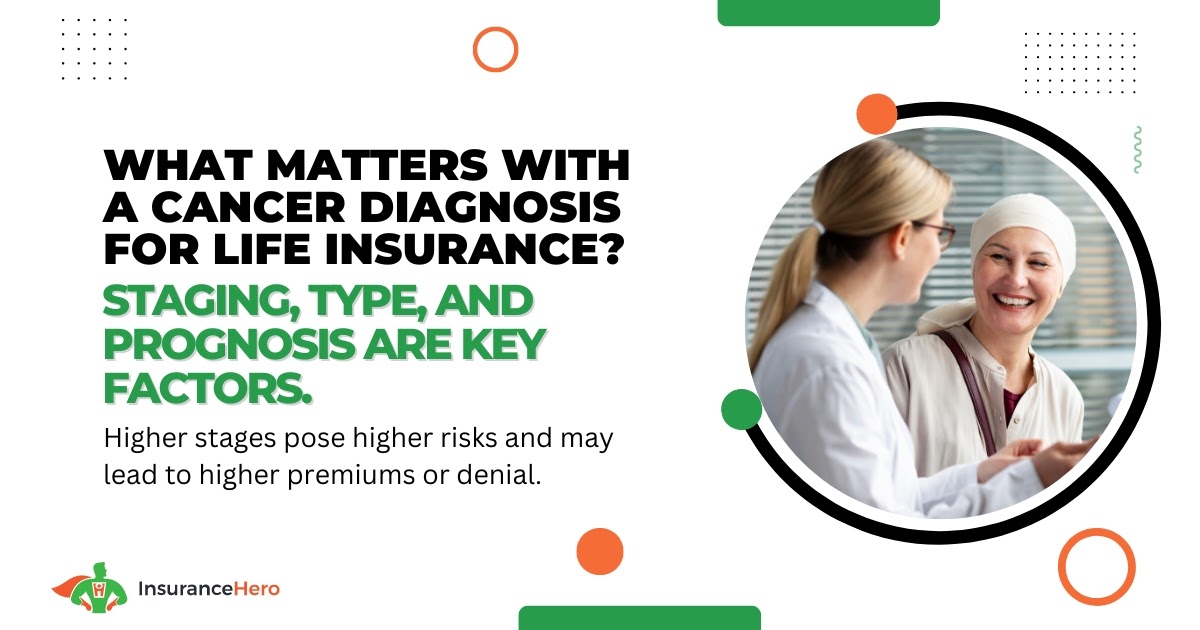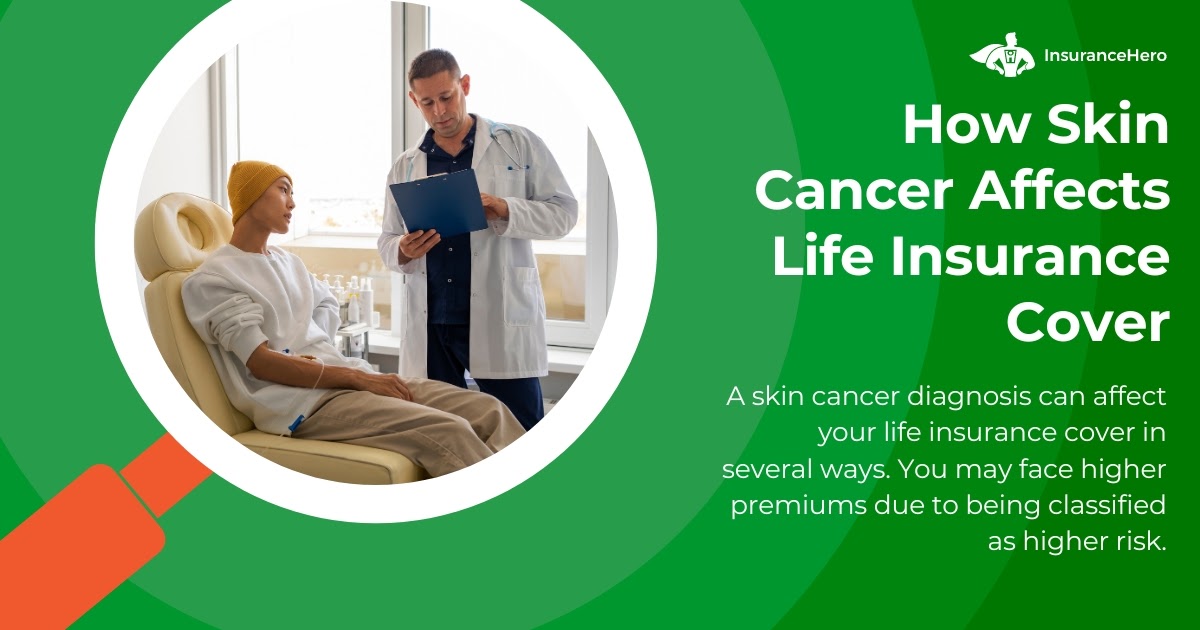Skin Cancer Life Insurance Cover, Is It Possible?

Cancer can be a devastating illness, and it can be difficult to discuss primarily because it’s not just one disease.
Skin cancer isn’t an immediate death sentence. In many cases, surgical removal forestalls any long-term risk, and stage I disease has a 90%+ five-year survival rate – but it’s still enough to make you shift your priorities.
Life Insurance With Skin Cancer In Summary:
Cancer is a significant factor for your current and future health, so it begs the question: Can you still get skin cancer life insurance cover if you’ve been diagnosed with skin cancer?
Here’s why it’s worth considering:
- Life insurers assess you based on the type of skin cancer, its stage or grade, and whether it has spread. Previous treatment alone doesn’t rule you out.
- If your skin cancer was treated several years ago, insurers are more likely to offer favourable terms. The longer you’re cancer‑free, the better your chances of securing standard or even preferred rates.
- Non-melanoma cases often have better rates. Basal-cell and squamous-cell carcinomas (non-melanoma types) are typically viewed more favourably by underwriters due to their lower risk profile, usually qualifying you for standard or preferred pricing after treatment.
Compare Cancer Life Insurance Quotes From The UK’s Top Providers, Completely Free Service, Save Money Now


Cancer is an entire class of diseases, and they range from easily curable to incurable
Any cancer diagnosis, from a small mole to the bad news following a hospital visit, can cause many people to reevaluate their lives and their plans.
In the UK, the most common cancers are breast and prostate (for females and males, respectively), followed by lung and bowel cancers. Meanwhile, skin cancer – melanoma, specifically – is the fifth most common cancer in the UK.
Among the many different concerns that can arise when you’re facing a cancer diagnosis, minor or significant, is the future. Even if your prognosis is excellent, you’re still going to think about what happens when you’re gone.
Planning for the future, especially after you pass away, often involves discussions about life insurance.
One thing you may know about skin cancer life insurance is that the quotes you get—and sometimes even your chances of approval—can depend on your health situation.
Does a Cancer Diagnosis Disqualify You from Life Insurance Cover?
Let’s get the easy question out of the way first.
If you’ve been diagnosed with cancer, whether it’s skin cancer or another cancer, will it disqualify you from getting life insurance cover?
You can still get life insurance cover if you’ve been diagnosed with cancer. However, there are details and nuances to this that make it a little harder to say with certainty what your life insurance quote will look like.

Can You Lose Life Insurance if You’re Diagnosed with Skin Cancer?
The general idea of life insurance is that you purchase it when you’re in good health to insure against death and provide a benefit to your loved ones if you perish during the term you’re covered.
This is why insurance providers are often stingy with their coverage when it comes to people who are ill; they are hedging that you’ll remain healthy so that they can continue to pay for your policy as long as possible.
The less likely you are to live, and the greater your risk of triggering a death benefit payout, the more they want to get out of you for that cover because they’ll need to pay out with a higher percentage chance of certainty.
What they don’t do is cancel your life insurance at the first sign of trouble. After all, if they did that, they would never pay out to anyone, so no one would buy in, and the industry would collapse.
So, if you already have life insurance cover and you are diagnosed with skin cancer, your policy and cover will continue as normal. You don’t get a benefit paid out unless you become terminal (with specific definitions) or you pass, but neither will your premiums go up because of the diagnosis.
However, a diagnosis can cause three effects down the road.
Because your diagnosis is part of your medical history, if you need to change your cover in some way, such as increasing your policy value or rolling over from the end of one term to another term, you will generally have to go through the underwriting process again.
This will disclose the cancer diagnosis and may affect your cover, usually by increasing your premiums.
You may be able to circumvent this by using a special event option to change your cover without underwriting, but this requires that the option be available with your insurance provider and that you have a qualifying event, such as getting married or having a child.
Secondly, if your policy lapses and you lose coverage, getting coverage again—especially at a higher level—will be more expensive. Unfortunately, previous coverage does not help you get future coverage.
Third, if you have an advanced case and are declared terminal, some insurance providers offer terms that allow you to pay while you’re still alive.
This can be useful for estate planning, investing, funding trusts, or otherwise managing that money, particularly on behalf of a child, before you die. Being declared terminal is not ideal, but at least in this small way, you can make the most of it.
Fortunately, skin cancer is one of the handful of cancers that is both very common and mostly non-threatening.
It’s hard to say that any cancer is “harmless.” Still, given that many skin cancers can be treated with a simple surgical removal, they also generally aren’t going to be fatal themselves.
Some doctors describe it as a cancer that you die with, not die of, though there are occasional cases to the contrary. Of course, you likely are keenly aware if you’re one of those cases, and if you are, we wish you all the best.

What Matters with a Cancer Diagnosis for Life Insurance?
If you’ve been diagnosed with skin cancer and you want to obtain new life insurance coverage, your insurance provider is going to ask some questions.
Many of these questions will centre around specifics related to the kind of cancer, the staging of that cancer, and the prognosis of that cancer.
- The higher the stage of a cancer, the more advanced it is. In general, higher stages indicate that it has infiltrated tissues beyond the cells of origin and may have migrated to other locations. Higher staging means higher risk, more arduous treatment, lower likelihood of response to treatment, and greater risk of fatality, all leading to either significantly higher life insurance premiums or a complete denial of coverage, depending on the provider.
- The type of cancer matters. Some cancers are more aggressive, harder to treat, or harder to detect until they’re already advanced. However, since we’re talking specifically about skin cancer today, we won’t dwell on this much.
- Your prognosis is important. If your skin cancer was just a simple mole that was easily removed, there’s not much chance of it becoming aggressive and fatal shortly. The worse your prognosis is, the harder it might be to get cover.
Additionally, if your diagnosis was not recent, the length of time since your diagnosis – and the amount of time since any evidence of recurrent disease has appeared – will also matter.
For example, the larger the cancer removed and the staging of that cancer, the longer you generally have to go without recurrence before your rates will return to baseline.
| Cancer Type | 5-Year Recurrence Rate |
|---|---|
| Colon Cancer Stage I | 6.8% |
| Colon Cancer Stage II | 11.6% |
| Colon Cancer Stage III | 24.6% |
| Non-melanoma Skin Cancer | 40% |
| Primary BCC | 1% |
| Recurrent BCC | 5.6% |
| Breast Cancer | 10.4% |
| NSCLC Stage 1 | 19% |
| NSCLC Stage 2 | 27% |
| NSCLC Stage 3 | 40% |
| Merkel Cell Carcinoma | 40% |
You’re usually in the clear if you’ve been out for 5 years with no recurrence. However, for smaller, low-stage cancers, it may be only 2-3 years; larger or higher-stage cancers can be 7 or longer.
Age and context can also be important. If you’re already over the age of 60 or 70, you’ve been diagnosed with stage I or pre-I skin cancer, and you’re looking for cover, it may not impact your quotes or rates much at all.
After all, when your age is already advanced, something not very advanced may not be the riskiest thing about your health.

How Skin Cancer Affects Life Insurance Cover
We’ve already mentioned how a diagnosis impacts the coverage you already have and the factors about cancer that matter when applying for new coverage, but how might your coverage change when you’ve been diagnosed?
Generally, there are a few things that can happen.
The most common is simply that, as someone with a known health issue, you are classified as higher risk than an otherwise healthy individual.
This will negatively impact your premiums. All else being equal, you’ll end up paying more for the coverage you want in your policy than if you hadn’t been diagnosed.
Depending on the factors listed above, it may not be much more, but it will be different.
Some of the pickiest insurance providers might choose not to offer you a quote. However, this is more applicable to more aggressive and dangerous types of cancers.
Skin cancer is generally not nearly as dangerous, though this goes on a case-by-case basis. Others may offer you cover but charge a higher premium.
You may also have a specific rider put on your cover. These riders are often exempt from a particular illness and are usually timed.
So, after a skin cancer diagnosis, you may be given coverage from an insurance provider, but with the stipulation that skin cancer specifically is not covered for the first year or two after your coverage begins.
Any other cause of death is covered, but if your skin cancer comes back with a vengeance, it isn’t covered.
Does Critical Illness Cover Skin Cancer?
Critical illness insurance may not cover early-stage or non-invasive skin cancers, as these are generally considered low-risk conditions with minimal lifestyle impact.
However, some policies include partial payouts for non-melanoma cases or offer broader cancer protection, depending on the insurer.
In such cases, you might receive a percentage of your total cover amount, allowing you to retain the remainder of your policy for future claims. Coverage terms vary, so reviewing the specifics of each policy is essential.
Disclaimers and Protections
One of the most important considerations is that the law offers protection. Skin cancer is generally a very treatable and curable cancer, and even in the worst cases, it’s still typically manageable.
This is reflected in the generally low staging and the long-term prognosis for skin cancer.
The Disability Discrimination Act and the Equality Act put restrictions on insurance providers.
Among those restrictions are rules against charging higher premiums if the prevailing statistics and medical information indicate that your type, staging, and specific type of skin cancer are curable, manageable, or highly survivable.
In other words, everything we’ve mentioned above is generally for extreme and advanced cases.
If you were diagnosed with skin cancer because you had a non-problematic mole removed, and it happened to be cancerous.
You have no other signs or symptoms, so your insurance providers generally shouldn’t charge higher premiums because of it.
However, this does require that your insurance provider have access to your reliable medical information, not just the answers you provide on a form.

Another thing we have to mention is that all of this is very much considered on an individual basis. Your exact specific situation, even if you have a common type of skin cancer, is going to be unique.
Your unique health considerations, age, gender, weight, and other health issues all combine to create a unique profile of you and your health, along with your risk of death from various covered and uncovered causes.
Furthermore, every insurance provider will be different. Some are much more open about whom they quote, and some charge more for the same coverage.
This is why it’s important to ensure you’re getting quotes from as many of the UK’s top insurance providers as possible.
Some providers will offer better deals than others, with more or fewer riders, and you need to pick the offers with the best possible terms for you and your situation.
Fortunately, this is where we can help. Here at Insurance Hero, we make it easy to fill out a simple form with basic information, such as the amount of coverage you’re seeking and your contact information.
From there, we will secure quotes from the best insurance providers in the UK. All you need to do is compare the quotes and follow up on the one that best suits your needs.
To begin the process, click here.
Alternatively, you can call us and speak to a representative who will help you with the process and answer any questions (at least those related to life insurance) you may have.
Skin Cancer Life Insurance Research Sources:
- https://www.ncbi.nlm.nih.gov/pmc/articles/PMC3145327
- https://newsroom.uw.edu/news-releases/patients-rare-skin-cancer-face-40-recurrence-rate
- https://skincancer.net/types-signs/signs-of-recurrence
- https://www.associatedderm.net/unmasking-skin-cancer-recurrence-statistics
Steve Case is a seasoned professional in the UK financial services and insurance industry, with over twenty years of experience. At Insurance Hero, Steve is known for his ability to simplify complex insurance topics, making them accessible to a broad audience. His focus on clear, practical advice and customer service excellence has established him as a respected leader in the field.




